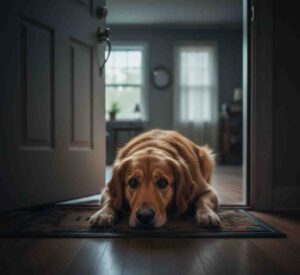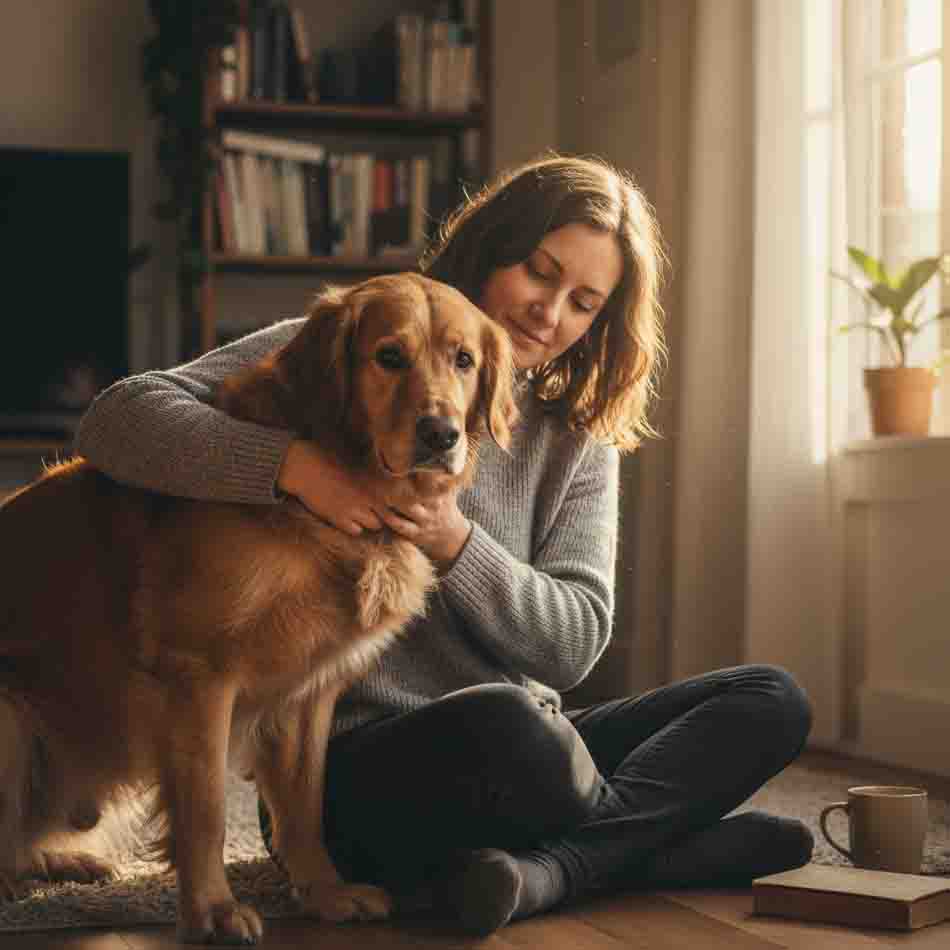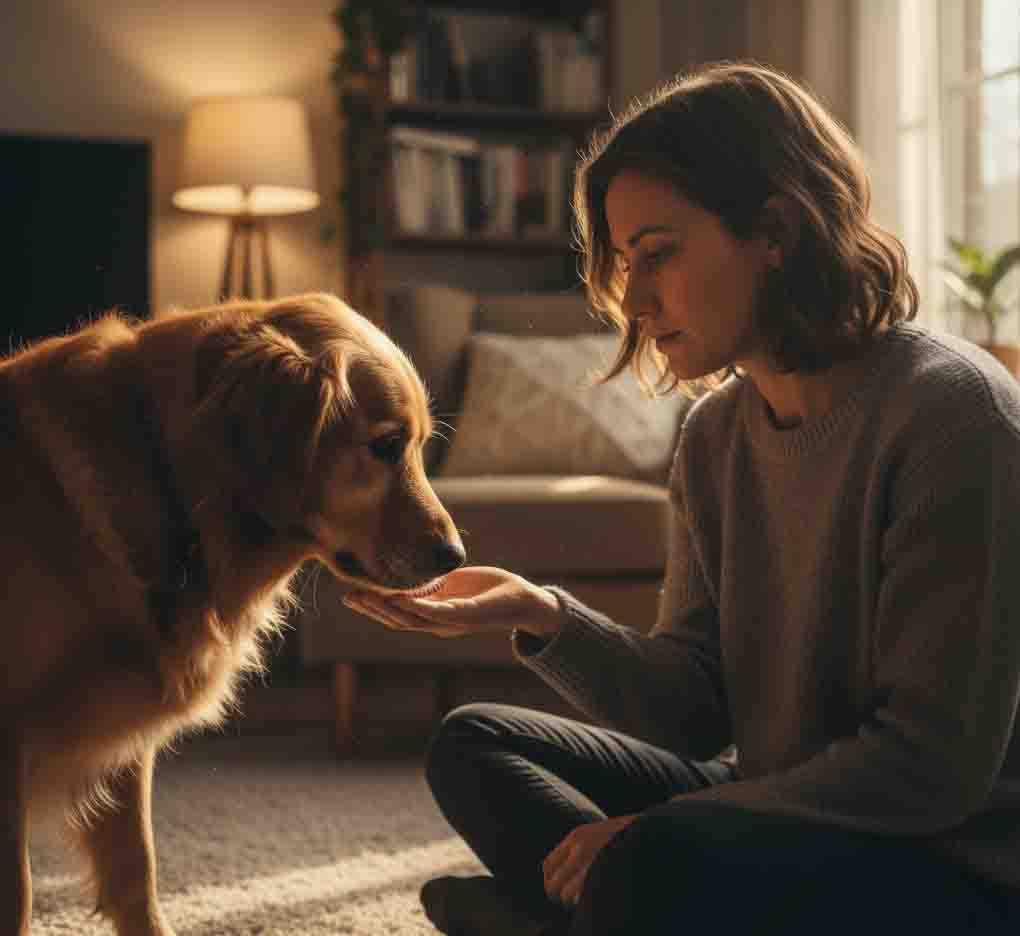The silence was the first thing I noticed after Biscuit passed away. Not just the absence of his paws on the hardwood floor, but the way his brother, Mochi, would sit at the door each evening, waiting for a companion who would never return.
For weeks, Mochi’s behavior puzzled me. He stopped playing with his favorite toys. He left his food bowl half-full. He’d wander through the house, sniffing corners where Biscuit used to nap, then lie down with a sigh that seemed to carry the weight of the world.
What I was witnessing wasn’t just confusion—it was grief. And like human grief, it manifests in ways we’re only beginning to understand.
The Language of Loss: How Pets Show Their Grief
Animals don’t mourn like we do, but they undoubtedly mourn. Through careful observation and consultation with animal behaviorists, I’ve learned to recognize the subtle signs:
Behavioral Shifts:
-
Decreased interest in food or play
-
Increased sleeping or lethargy
-
Searching behaviors – looking, sniffing, waiting
-
Vocalizing more or less than usual
-
Clinginess or, conversely, withdrawal from contact
Physical Manifestations:
-
Changes in grooming habits (over-grooming or neglect)
-
Stress-related symptoms like digestive issues
-
Sleeping in the deceased pet’s favorite spots
The Bond We Rarely See: Interpreting Animal Relationships
Dr. Elena Martinez, an animal behavior researcher, explains: “We often underestimate the complexity of animal relationships. Pets form intricate social bonds—they have preferred companions, established routines, and ways of communicating we’re only beginning to decode. When one passes, it disrupts their entire social world.”
The strength of the grief often reflects the depth of the bond. Pets who grew up together, spent years sharing space, or had complementary personalities may show more pronounced mourning behaviors.

A Companion’s Guide: Helping Your Pet Through Grief
Maintain Routines, Gently
While your instinct might be to comfort with extra treats and attention, sudden routine changes can add stress. Keep feeding times, walk schedules, and bedtime rituals consistent. Stability provides comfort when their world has been upended.
Allow the Process
Let your surviving pet sniff the empty bed, explore the spaces their friend occupied. These investigations help them understand the absence. Don’t rush to remove all traces of the departed pet—the familiar scents provide comfort during transition.
Introduce Enrichment Gradually
After the initial acute grief period (usually 2-4 weeks), slowly reintroduce mental stimulation:
-
Short, gentle play sessions
-
New walking routes for novel smells
-
Food puzzles to engage their mind
-
Extra affection when they seek it
The Scent Preservation Method
Before saying goodbye to a pet, collect a blanket or toy with their scent. Allow surviving companions to investigate it. This tangible connection helps some pets process the loss more gradually.
When to Seek Help: Recognizing Complicated Grief
Most pets navigate grief with time and support. However, seek professional guidance if you observe:
-
Complete refusal of food or water for more than 24 hours
-
Destructive behaviors or self-harm
-
Aggression toward other pets or people
-
Symptoms persisting beyond two months
Veterinary behaviorist Dr. Michael Chen notes: “While grief is normal, prolonged suffering isn’t. When mourning behaviors prevent an animal from engaging in life, it’s time to intervene.”
The New Normal: Honoring the Past While Moving Forward
Healing doesn’t mean forgetting. It means finding a new way to be in the world without that particular presence.
In our home, we created a small memorial garden where Mochi and I sit together. Sometimes he sniffs the lavender we planted in Biscuit’s memory. Other times, he just rests his head on my knee as we both remember in our own ways.
The grief softened gradually. After three months, Mochi started bringing me his ball again. His appetite returned. The evening waiting at the door stopped. He hadn’t forgotten—he had simply learned to carry the loss differently.
If you’re walking this path with your pet now, be patient with them, and with yourself. Their grief is a testament to a love that crossed species boundaries. And that kind of love never truly disappears—it just transforms into memory.
Has your pet experienced the loss of an animal companion? Share your experience in the comments—sometimes, the most healing thing is knowing we’re not alone in witnessing these quiet heartbreaks.





